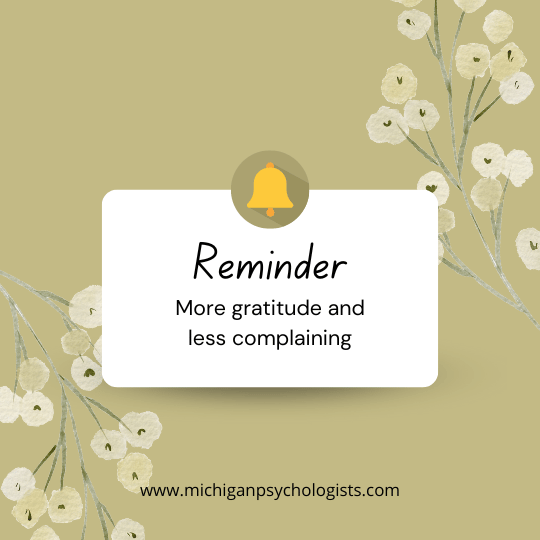Why People Complain

Table of Contents
People don’t complain because they’re negative. People complain because it’s the only way they know how to create connection with people around them.
— Dr. Nicole LePera (@Theholisticpsyc) May 25, 2024
Complaining often gets a bad rap. It’s viewed as a sign of negativity, a drag on conversations, and a spreader of bad vibes. But what if we flipped that script? What if we saw complaining not as a negative habit, but as a fundamental human attempt to connect? People don’t complain because they’re inherently negative; they complain because it’s the only way they know how to connect with those around them.
Understanding Complaining
Complaining comes in many flavors, from minor gripes about the weather to major grievances about work or personal relationships. At its core, complaining is a way to express dissatisfaction, seek validation, and sometimes even find solutions. But beyond these practical purposes, complaining serves a deeper, more social function.
The Science Behind Complaining
Humans are wired to seek out social bonds, and sharing frustrations is one way to achieve this. When people complain, they invite others into their emotional world, hoping for empathy and validation. This act of sharing creates a sense of belonging and shared experience, which are essential for mental well-being. Complaining, therefore, is less about the negative content and more about the connection it fosters.
The Social Aspect of Complaining
Complaining often serves as a powerful social tool. When people share their grievances, they create a sense of camaraderie. Think about a workplace. Many conversations start with a shared complaint about a tough project or a demanding boss. These shared moments of dissatisfaction can break the ice and build bonds, leading to deeper conversations and connections.
Humor and Connection
In the world of workplace dynamics, humor transforms the energy of complaining into something lighter and more manageable. Laughing over shared frustrations at work can turn the negative energy of complaints into a bonding experience. When people laugh together at the ridiculousness of their shared struggles, they feel seen and understood.
Psychological Insights
Complaining fulfills several emotional and social needs. When people complain, they are not just venting; they are seeking empathy and validation. This act of sharing grievances allows individuals to feel heard and understood, reinforcing their connection with others. It’s a powerful way to bond over common struggles and experiences.
The Role of Empathy
Empathy is the glue that holds these interactions together. When someone complains, they are often looking for an empathetic ear. Active listening and validation are crucial in these moments, showing the complainer that their feelings are acknowledged. This empathetic response not only addresses the complaint but also deepens the relationship, fostering trust and understanding.
Complaining as a Communication Tool
For many, complaining is a primary mode of communication, especially when other ways of expressing needs and emotions are not available or comfortable. Complaints can reveal underlying issues and provide insight into a person’s true feelings. Recognizing this can help address the root causes of complaints and improve overall communication.
Healthy Complaining vs. Negative Complaining
Not all complaining is created equal. There is a difference between productive complaining, which can lead to positive changes and solutions, and unproductive complaining, which can perpetuate negativity. Engaging in healthy complaining involves expressing dissatisfaction constructively and seeking solutions rather than simply venting. It’s about finding balance and ensuring that complaints foster connection rather than division.
Alternatives to Complaining
While complaining can be a way to connect, it is not the only method. Positive communication, shared interests, and supportive interactions are essential in building strong relationships. Finding balance and incorporating more positive interactions can enhance connections and reduce reliance on complaints.
10 Alternatives to Complaining and Why They Work
- Express Gratitude
- Why it Works: Shifts focus from negatives to positives, improving mood and fostering a more optimistic outlook.
- Seek Solutions
- Why it Works: Encourages proactive problem-solving, which can lead to tangible improvements and reduce feelings of helplessness.
- Practice Mindfulness
- Why it Works: Helps stay present and reduces stress by focusing on the current moment instead of dwelling on problems.
- Engage in Physical Activity
- Why it Works: Physical exercise releases endorphins, which can improve mood and reduce stress.
- Communicate Needs Clearly
- Why it Works: Directly expressing needs or concerns can lead to quicker resolutions and reduce misunderstandings.
- Reframe Negative Thoughts
- Why it Works: Cognitive reframing changes perspective, making challenges seem more manageable and less overwhelming.
- Practice Active Listening
- Why it Works: Listening to others can provide new perspectives and solutions, and strengthens relationships by showing empathy.
- Set Realistic Expectations
- Why it Works: Helps avoid disappointment and frustration by aligning expectations with reality.
- Engage in Creative Activities
- Why it Works: Creative expression can be therapeutic, providing an outlet for emotions and reducing stress.
- Seek Professional Help
- Why it Works: Therapy or counseling can provide strategies for managing stress and improving communication skills, leading to healthier interactions.
Complaining is not inherently negative; it can be a way to seek connection and empathy. By understanding the social and psychological aspects of complaining, it becomes possible to navigate interactions more effectively and foster healthier relationships. Being mindful of complaints and striving for constructive communication can help connect with others in more meaningful ways.